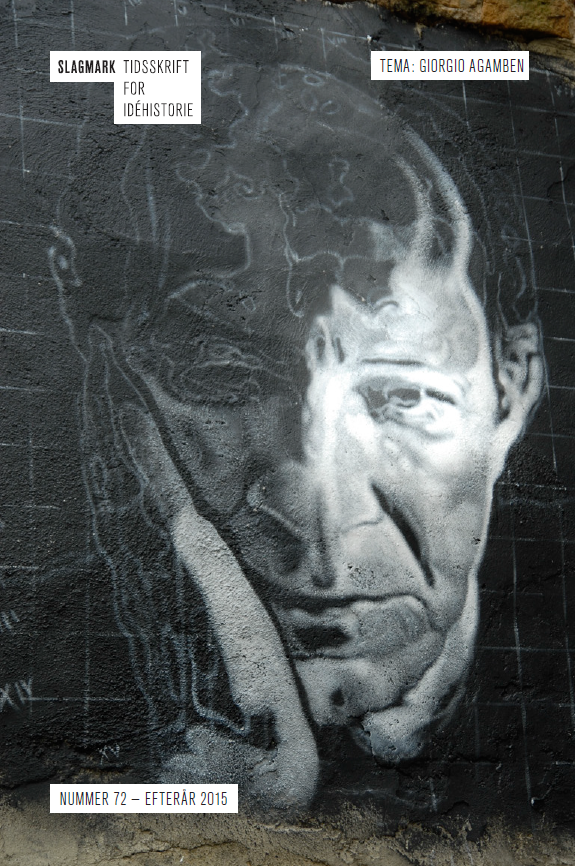Borgerkrig fra Athen til Auschwitz:
Et essay om de politiske (u-)muligheder i Agambens tænkning
DOI:
https://doi.org/10.7146/sl.v2015i72.107200Nøgleord:
civil war, revolution, state of exception, sovereign power, exodusResumé
The starting point of this article is the concept of civil war in Giorgio Agamben’s Homo Sacer-series. In spite of its relative obscurity, Agamben insists that civil war is the fundamental political structure, which has characterized all of Western history since Ancient Greece. As such it constitutes a privileged vantage point from whence it is possible to discern the limitations of his political thought. These limitations originate in his deployment of Carl Schmitt’s state of exception, which serves to include civil war in the sovereign order – this entails that classical modes of political contestation and conflict e.g. revolution, are always already internal to the sovereign state, and can therefore only serve to reaffirm it. The state of exception thus produces an inherent incapacity to think or move beyond the sovereign state. Agamben subsequently attempts to challenge the state of exception albeit with varying degrees of success. This suggest the necessity of taking exception to the exception and explode the conceptual coupling of civil war and sovereign power, in order to create a space where it is possible to think political contestation within or beyond the works of Agamben.
Referencer
Agamben, G. (1998 [1995]). Homo Sacer: Sovereign Power and Bare Life. Stanford, CA: Stanford University Press.
Agamben, G. (2004 [1999]). ‘I am sure that you are more pessimistic than I am …’: an interview with Giorgio Agamben. Rethinking Marxism, 16:2, 115-24.
Agamben, G. (2008 [1998]). Remnants of Auschwitz: The Witness and the Archive (Homo Sacer III). New York, NY: Zone Books.
Agamben, G. (2009 [2003]). Undtagelsestilstand (Homo Sacer II,1). Århus: Forlaget Philosophia.
Agamben, G. (2011 [2007]). The Kingdom and the Glory: For a Theological Genealogy of Economy and Government (Homo Sacer II,2). Stanford, CA: Stanford University Press.
Agamben, G. (2013a [2011]). The Highest Poverty: Monastic Rules and Form-of-Life (Homo Sacer IV). Stanford, CA: Stanford University Press.
Agamben, G. (2013b). Il mistero del male. Benedetto XVI e la fine dei tempi. Rom, Laterza.
Agamben, G. (2014). What is a Destituent Power? Society and Space, 32, 65-74.
Agamben, G. (2015a [2014]). Elementer til en teori om den destituerende magt. Slagmark – Tidsskrift for idéhistorie, 72, Giorgio Agamben.
Agamben, G. (2015b [1996]). Midler uden mål - Noter til Politikken. Skive: Forlaget Wunderbuch.
Arendt, H. (1977 [1963]). On Revolution. London: Penguin Books.
Benjamin, W. (1999 [1921]). Zur Kritik der Gewalt. I Walter Benjamin: Gesammelte Schriften, Volume II.I. Frankfurt/Main: Suhrkamp Verlag, 179-204.
Clastres, P. (1987 [1974]). Society against the State: Essays in Political Anthropology. New York, NY: Zone Books.
Deleuze, G. & Guattari, F. (1998 [1980]). A Thousand Plateaus: Capitalism and Schizophrenia. London: Athlone Press.
Flohr, M. (2014). The Problem of Civil War in Agamben’s Thought. Semikolon, 27:15, 61-8.
Foucault, M. (2008 [2004]). Sikkerhed, territorium, befolkning – Forelæsninger på Collège de France 1977-1978. København: Hans Reitzel.
Foucault, M. (2011 [1976]). Viljen til Viden – Seksualitetens historie 1. København: Det Lille Forlag.
Hardt, M. & Virno P. (1996). Radical Thought in Italy: A Potential Politics. Minneapolis, MN: University of Minnesota Press.
Hobbes, T. (1994 [1651]). Leviathan: with selected Variants from the Latin Edition of 1668. Indianapolis, IN: Hackett.
Hobbes, T. (2010 [1679]). Behemoth, or, The Long Parliament. Oxford: Oxford University Press.
Jennings, R. (2011). Sovereignty and political modernity: A genealogy of Agamben’s critique of Sovereignty. Anthropological Theory, 11:1, 23-61.
Jessen, M.H. & von Eggers, N. (2013). Kongen hersker, men regerer ikke – Guvernementalitet, statificering og statspraksis hos Michel Foucault. Slagmark – Tidsskrift for idéhistorie, 66, Michel Foucault, 89-108.
Lenin, V. (1964 [1924]). A Caricature of Marxism and Imperialist Economism. I Lenin Collected Works, Volume 23. Moskva: Progress Publishers, 28-76.
Lenin, V. (1992 [1917]). The State and Revolution. London: Penguin Books.
Marx, K. & Engels, F. (1998 [1848]). The Communist Manifesto. London: Verso.
Marx, K. (2014 [1872]). La Liberté Speech. Marxists.org [https://www.marxists.org/archive/marx/works/1872/09/08.htm] tilgået 14. nov. 2014.
Meier, C. (1990). The Greek Discovery of Politics. Cambridge, MA: Harvard University Press.
Negri, A. & Hardt, M. (1994). Labour of Dionysus: A Critique of the State–form. Minneapolis, MN: University of Minnesota Press.
Negri, A. & Hardt, M. (2004). Multitude: War and Democracy in the Age of Empire. New York, NY: Penguin.
Schmitt, C. (1963). Theorie des Partisanen: Zwischenbemerkung zum Begriff des Politischen. Berlin: Duncker & Humblot.
Schmitt, C. (2002 [1927]). Det politiskes begreb. København: Hans Reitzel.
Schmitt, C. (2009 [1922]). Politisk teologi – fire kapitler om suverænitetslæren. I Politisk teologi og Romersk katolicisme og politisk form, København: Informations Forlag, 21-82.
Tiqqun (2010 [2001]). Introduction to Civil War. Los Angeles, CA: Semiotext(e).
Tronti, M. (2007 [1965]). The Strategy of Refusal. I S. Lotringer (red.) Autonomia: Post-political Politics. Los Angeles, CA: Semiotext(e), 28-35.
Downloads
Publiceret
Citation/Eksport
Nummer
Sektion
Licens
Ophavsretten til artiklerne i Slagmark deles mellem forfatter og Forlaget Slagmark.
Artikler og tekstmateriale publiceret i Slagmark må citeres, downloades og videresendes for ikke-kommerciel brug, under forudsætning af normal akademisk reference til forfatter(e) samt tidsskrift, årgang, nummer og sider.
Brug og distribution af tekstmateriale både i form af papirkopier og elektroniske kopier, til undervisningsbrug på uddannelsesinstitutioner og intern brug er tilladt efter aftale med Copydan Tekst & Node. Brugen skal ske inden for aftalens rammer.
Artikler og tekster må kun genudgives med eksplicit tilladelse fra forfatter(e) og tidsskriftet med en anerkendelse af værkets første publicering i nærværende tidsskrift.





